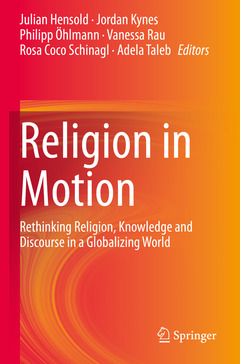Description
Religion in Motion, 1st ed. 2020
Rethinking Religion, Knowledge and Discourse in a Globalizing World
Coordinators: Hensold Julian, Kynes Jordan, Öhlmann Philipp, Rau Vanessa, Schinagl Rosa Coco, Taleb Adela
Language: English
Subject for Religion in Motion:
Keywords
Critical Research on Religion; De-Centering Religion; Early Career Scholars and Sr Researchers/Experts in the Field; Gender; Materiality and the Body; Post-secular religion; Provincialising Europe; (Relgious) Knowledge Production; Religion and Politics; Religion in Trans-Disciplinary Perspective; Theology; Religious Studies Social Science and the Humanities
Publication date: 05-2021
Support: Print on demand
Publication date: 05-2020
255 p. · 15.5x23.5 cm · Hardback
Description
/li>Contents
/li>Biography
/li>Comment
/li>
This volume offers innovative approaches to the study of religion. It brings together junior and senior scholars from the Global North and South. The contributors also explore the context-specific formations of religion and religious knowledge production in an increasingly instable and incalculable, globalized world.
In the spirit of the challenging slogan, ?Religion in Motion. Rethinking Religion, Knowledge and Discourse in a Globalizing World,? the book bundles voices from a great variety of cultural and academic backgrounds. It offers readers a cross-continental exchange of innovative approaches in the study of religion. Coverage intersects religion, gender, economics, and politics. In addition, it de-centers European perspectives and brings in perspectives from the Global South.
Chapters examine such topics as feminine power and agency in the Ile? Axe? Oxum Abalo?, queering the Trinity, and faith and professionalism in humanitarian encounters in post-earthquake Haiti. Coverage also explores notions of development in African initiated churches and their implications for development policy, the study of religion as the study of discourse construction, rethinking the religion/secularism binary in world politics, and more. This book will appeal to students and researchers with an interest in Religion and Society, Philosophy and Religion, and Religion and Gender.




